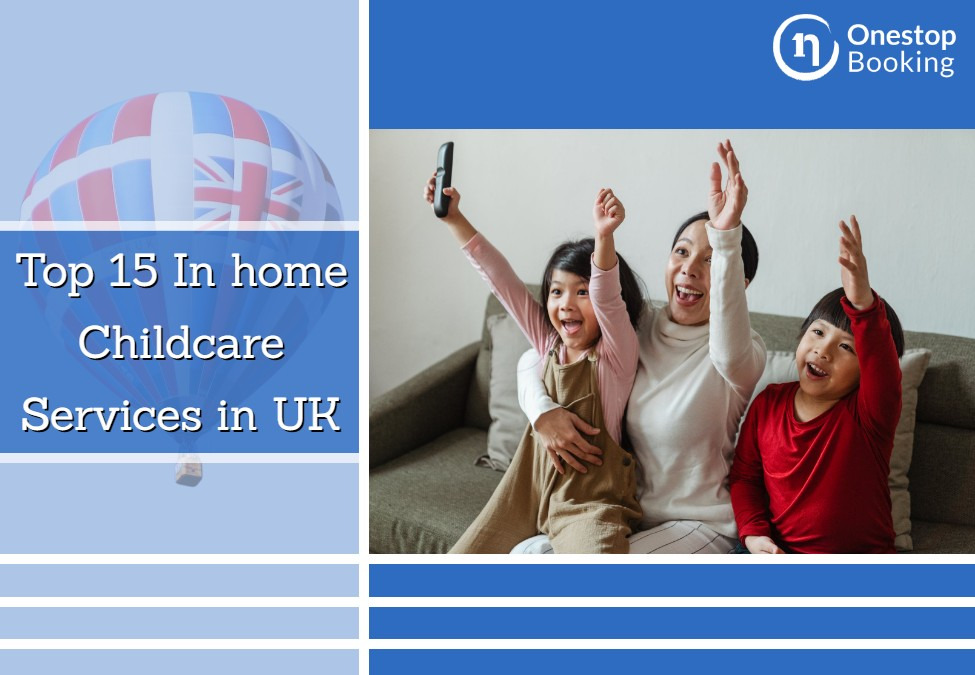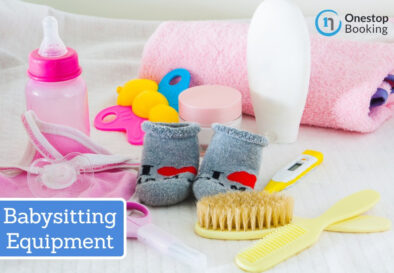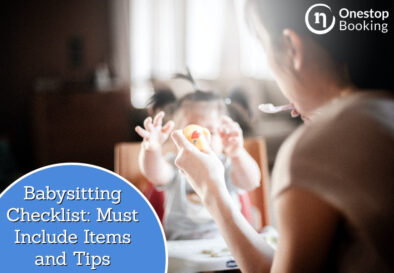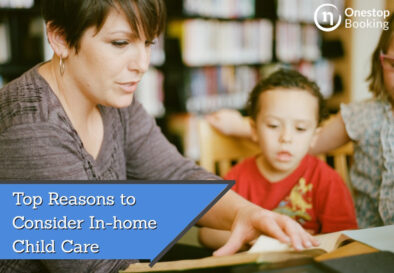The most common childcare options are au pairs, daycare centers, home daycares, preschools, and in home childcare. Are you looking for a childcare option for your needs? This article discusses in home childcare services in UK.
What is In home Childcare Services?

Also referred to as family care, in-home childcare is the type of childcare where a family pays a professional childcare expert to care for their kids in a home setting. Many in-home childcare service providers in the UK can care for children from toddlers to school age. Parents of newborn babies can opt for live-in nannies.
Home childcare providers must have training in childcare, safety, and first aid and hold a license from the state. Some in-home childcare service providers have early education and social care training. In some in-home childcare facilities, parents must bring snacks and meals for their children. However, some service providers’ childcare costs are inclusive of meals.
What are the Benefits of In home Childcare?
Whether you hire someone to care for your child in your own home or register them for home-based care in a children’s center, here are the benefits of this service.
· Develops Secure Attachments
Children should develop secure relationships with the people they spend most of their time with from an early age. Such relationships create a foundation that shapes their attitude and behavior in future relationships. Choosing in home childcare services in UK means your child will interact with the same caregivers consistently. Besides safeguarding the children’s safety, home-based care provides an avenue to develop warm and predictable relationships between the caregiver, parent, and child.
· Low Adult and Child Ratio
A low adult and child ratio allows caregivers to customize the care to meet every child’s routines, interests, and needs. Regulatory bodies in the UK determine these ratios with some facilities licensed to care for up to six children under two years.
· Flexibility
In-home childcare providers allow parents more flexibility compared to other childcare services. Some home-based childminders can accommodate your schedule allowing you to focus on other essential activities.
· Limited Numbers
Some daycare centers accommodate up to 15 children, with only two adults to monitor the kids. In this setting, the needs of each child are hardly met. Home-based centers can only take a limited number of children meaning the caregivers can offer personalized services based on the needs of each kid. Further, some home-based facilities have a family information service center where parents can voice their complaints or make inquiries.
· Reduced Stress
In home childcare service providers strive to adhere to your child’s routine and cater to their needs responsively. Children will feel comfortable as they would at home, mainly because these facilities are only licensed to care for a limited number of children.
· Noise Regulation
Home-based childcare facilities are less noisy due to the limited number of children. This can be ideal for children who can’t cope in noisy environments.
· Child Development
In home childcare services are tailored to encourage motor skills development in children. Caregivers pay close attention to every child and help them to improve all their skill sets in preparation for school.
Top 15 In home Childcare Services in UK
Managing a full-time or part-time job with young kids can be challenging. However, using childcare services can help you navigate your schedule with ease. In the UK, childcare comprises a blend of private and public provisions. Here are quality childcare services every parent should know about.
1. Preschool and Daycare
There are various daycare options for children in the UK. Your options depend on your kid’s age, region availability, and preferences. Remember, early-year carers should be Ofsted registered.
2. Playgroups
Playgroups are informal sessions for kids between two to five years. Playgroup sessions often last two to four hours in the morning or afternoon. The facilities are smaller than nursery classes and usually provide play-based activities for children. Private playgroups charge a small fee per session, but you can still access public playgroup facilities that offer free services. Religious buildings or community centers accommodate public playgroups, and staff working there are volunteers.
3. Crèches

Crèches are time-limited daycare centers based within specific premises like workspaces or leisure centers. They are staffed by professional crèche workers, and many parents use them while accessing services in those facilities.
4. Nursery Schools and Preschools
Nurseries and preschools cater to kids between the age of two to five years. They provide structured learning sessions in a classroom setting. The staff here are professionally trained and qualified. These institutions are usually affiliated with specific primary schools and can be based inside the school’s facility. Often, the school outsources the running of the nurseries and preschools to a third party in the voluntary, public, or private sector. These facilities open during regular working hours on weekdays and remain closed during school holidays.
5. Sure Start Children’s Centres
The Sure Start scheme launched children’s centers in the 1990s as part of the UK government’s initiative to guarantee free childcare service to every family. Today, many of these facilities have transformed into private nurseries. Still, parents can access children’s centers in the UK that offer different services for children below five years.
6. International Childcare
Many international schools in the UK offer preschool nursery facilities for children between two to three years. Usually, international childcare services are more expensive than traditional daycare centers in the UK. However, they offer high-quality teaching within a globalized setting. These facilities can ease your child’s transition from nursery to primary school.
7. Nannies

Nannies offer childcare in your home and can work part-time or full-time. If you employ a nanny, you’re tasked with preparing their national insurance and tax payments. Nannies will offer their services within the agreed-upon hours. They can also provide additional services like washing children’s bed linen and clothes and putting them to bed at night. While nannies don’t have to be Ofsted registered, you must conduct a thorough DBS check on your preferred candidate.
8. Day Nurseries
Day nurseries in the UK offer childcare for newborns up to five-year-olds. While many of these service providers are in the private sector, there are a few non-profit and public nurseries in the UK. Day nursery care is also available in some workplaces. Regardless of the service provider you choose, you must pay for the daycare, even though you may get a percentage of tax credits. Day nurseries open during regular working hours on weekdays.
9. Au pairs in the UK
Au pairs are international childcare providers. Often, they are students taking a break from their studies to learn the culture and language of a different country. They live with a family and offer light housekeeping and childcare services for six to 12 months. While Au pairs aren’t classified as employees, they offer up to 30 hours of their services in exchange for a minimum of £90 as pocket money and accommodation weekly. The hosting family should allow them time to attend language classes
10. Babysitters
Babysitters offer temporary childcare for a few hours per day when the parents need to attend to other duties. While many families use their friends or families as informal babysitters, professional babysitters are available in the UK. Babysitters don’t require experience or formal qualifications.
11. Employer Childcare
Some employers offer childcare support in the UK. Often, the support may comprise workplace nurseries, childcare vouchers to enable workers to pay for childcare services, or directly hired childcare, where the employer hires an external commercial childcare provider to cater to their employee’s needs.
12. Community Childcare
Community and voluntary childcare services are available in various areas. They are a supplement to private and statutory sector provisions. Often, this comprises short sessions staffed by volunteers and usually occurs during the day. Examples of these services include early learning activities and toddler and baby playgroups.
13. Before- and After-school Clubs
Out-of-hours clubs for school-age children offer childcare services for parents who work between 08:00 to 09:00 and 16:00 to 18:00. After-school clubs can provide different activities like games, arts, and sports. Some clubs offer snacks or meals. Parents eligible for the tax-free childcare or universal credit program can use it to cater to up to £2,000 out-of-school childcare costs per child.
14. Childcare during school holidays
Arranging childcare during the school holiday can be challenging. While the school holiday in the UK lasts up to 13 weeks, annual leave lasts a few weeks for full-time employees. Working parents without friends or relatives who can care for their children must consider holiday-based childcare options.
15. Childminders

Childminders are self-employed qualified professionals who provide family support for your child in their own homes. Besides being Ofsted registered, childminders in the UK must complete paediatric first aid training. You can learn about the Ofsted registration process from gov.uk. Registered childminders are more flexible than preschools and nurseries. For example, some offer their services during the weekends, evenings, and school holidays. You must sign a childcare contract with your preferred childminder indicating the number of hours, pay rates, services the childminder will offer, and general terms and conditions
Conclusion
Whether you’re a part-time or full-time employee, in home childcare services in UK can help you easily navigate your schedule. Choosing the best service for your needs can be difficult, especially with numerous options available. Read and use the information in this article to make a worthwhile decision.













